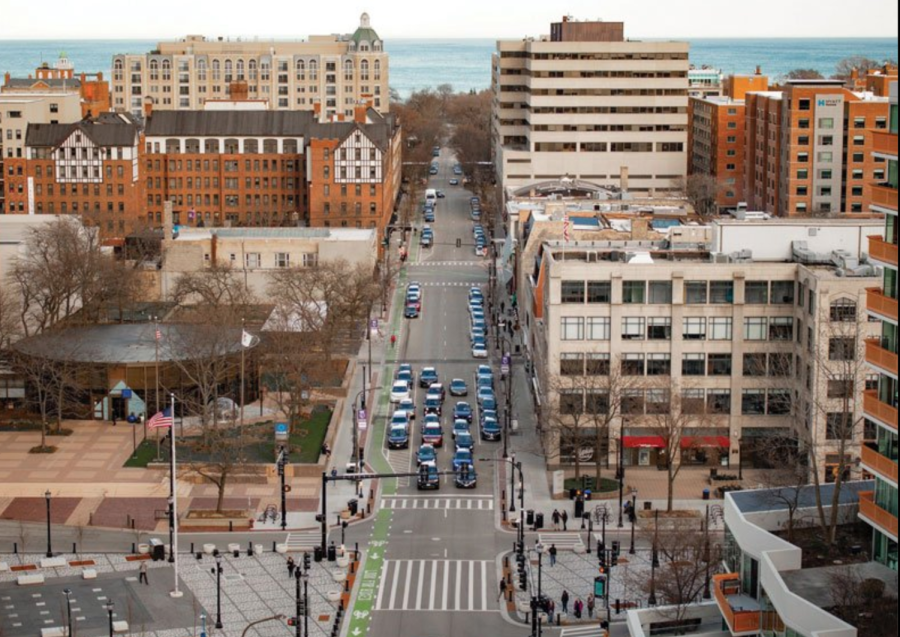Evanston, NU collaborate on guaranteed income pilot
Daily file photo by Evan Robinson-Johnson
Evanston and Northwestern’s joint guaranteed income pilot program sent out its first round of payments Dec. 1.
January 18, 2023
In December, Evanston began giving $500 each month to 150 residents as part of the city’s guaranteed income one-year pilot program.
The city launched applications for the program in August, selected a cohort of recipients and has sent out two rounds of payments so far. Evanston is running the pilot in conjunction with Northwestern, which is researching how the money impacts residents’ quality of living and the community as a whole.
The program follows an already circulating body of research that shows guaranteed income has benefits, research project manager Jeff Thomas said.
“In recent history, the city that put it on the map was Stockton, California,” he said. “(Martin Luther King Jr.) even spoke about universal basic income back then. It’s not a new concept by any means. Once people started getting stimulus checks, it’s not a huge leap.”
The financial toll of the COVID-19 pandemic helped push Evanston toward offering residents guaranteed income, Thomas said.
That pressure, combined with research, created both a national and local need for guaranteed income, according to Mayor Daniel Biss.
“It’s an important transformation occurring in the way that public benefits are distributed,” Biss said. “There’s robust data coming back from across the country, and it’s working. It’s important for us to be a part of that effort.”
The project costs around $1.1 million, $900,000 of which will go directly to participants. The remaining funds finance research and administrative needs. Evanston invested $700,000 of American Rescue Plan Act funds into the project, and NU $400,000 from its budget.
The city sent its first payment in the form of city-issued debit cards to 150 low-income residents Dec. 1 and will load additional funds every month, Biss said.
To qualify for the program, residents needed to make at or below 250% of the federal poverty line and be between 18-24 years old, 62 and older or an undocumented community member. From the pool of eligible applicants, the city used a lottery system to select a 150-person test group to receive payments for the study.
As of Jan. 16, 503 other applicants opted in to participate as the study’s benchmark group, Thomas said.
SESP Prof. Jonathan Guryan and graduate researchers Sheridan Fuller, Phoebe Lin and Claire Mackevicius work with Thomas to gather qualitative and quantitative data for the study. They plan to conduct in-depth surveys and interviews with participants to gauge how the additional income affects their ability to afford food, energy and other costs, Thomas said.
After the payments conclude in November, the researchers will also look at aggregated data to compare what goods and services the test and control groups spent money on.
“Candidly, my hypothesis is (this research) will follow suit to what’s already been done,” Thomas said.
Former Ald. Cicely Fleming (9th) said she introduced the project idea to City Council after discussing it with Dave Davis, NU’s executive director of neighborhood and community relations. Fleming pushed for the program to be an academic study so participants would be less likely to see government benefits be reduced, she said. She worked on the program for a year and a half before it launched.
Having spoken to some residents about the program, Fleming said the community’s reactions are mixed.
Some residents asked Fleming if the city will continue to run the program past the initial year. A few expressed disappointment at not winning the lottery to receive the money, she said.
Others told Fleming they did not want the city to hand out money. To those residents, Fleming said she pushed back with the same argument she gave councilmembers who doubted the plan.
“How can we give money to businesses under the guise of COVID recovery, but we wouldn’t do the same thing for the taxpayers?” she said. “Explain to me why it’s okay to give businesses $3 million but we complain about giving residents $700,000.”
What makes guaranteed income so important, she added, is that it gives low-income residents choices for what to spend government aid on.
Thomas said that while the research team is still in early stages of gathering data, he has already had emotional conversations with residents about how the additional income affects their lives.
“I heard about people that, when they were picking up their debit card, they were literally in tears of joy,” he said.
Fleming said she hopes the city will continue expanding guaranteed income programs and that, like Thomas, she already knows what the results will be.
“Having been raised here, having lots of family here and having been poor when I was younger, I understand the benefit of cash in hand,” she said. “I didn’t need the study to tell me what life experience told me.”
Correction: A previous version of this story misstated the time period when former Ald. Cicely Fleming (9th) worked on the guaranteed income pilot. The Daily regrets the error.
Email: williamtong2026@u.northwestern.edu
Twitter: @william2tong
Related Stories:
— Evanston launches Guaranteed Income Pilot program with Northwestern
— Cicely Fleming departs from City Council after five years of service



